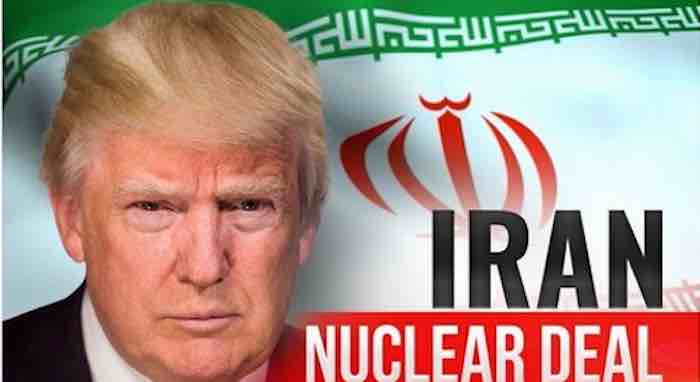Iran will have to cut a better deal or risk becoming another North Korea. And as we recently learned, even North Korea doesn’t want to be North Korea
Bailing out on a bad deal with Iran stabilizes the chances for peace
 WASHINGTON, D.C.
WASHINGTON, D.C. — Breaking news: Everything is not all about Trump. The death of the Iran nuclear deal is one of them.
Dumping the deal was more a mercy killing than anything else. Yet many will continue to debate the wrong issue — whether or not we should have stayed in the deal.
The real issue is, does Trump know what to do next? The answer, fortunately, appears to be yes.
Here’s what we know about the deal. It didn’t make the Iranian regime any better. In fact, Tehran’s foreign policy today is more destabilizing and threatening than the day the deal was signed.
The agreement didn’t prevent Iran’s leaders from getting nuclear weapons. They continued all the activities needed to obtain a weapons program, including developing long-range nuclear missiles and improving their nuclear technology. They only thing they haven’t done is produce weapons-grade nuclear material — a step, by the way, they hadn’t take before they signed the deal.
The deal didn’t even make Iranians happy. The regime didn’t reap the economic windfall it expected from foreign direct investment.
Thinking the agreement was sustainable over the long term was a false hope. It was bound to die sooner or later, because neither side’s core interests were really satisfied.
Trump demanded additional measures to insure the Iran regime would not be a future threat.
If Germany, France and the United Kingdom had fully agreed to these measures, Iran likely would have pulled out of the deal. Not getting these assurances, there was no reason for the U.S. to stayin the deal — which would have hamstrung the U.S. into taking sterner measures against Tehran.
Nor can the deal limp along without U.S. participation. Doing business with Tehran is extremely difficult. No European government is going to make that heavy lift — to make it easier just to fill the pockets of a corrupt, dangerous, authoritarian regime.
In pulling out, the U.S. lost zero real credibility. North Korea certainly doesn’t see us as feckless. Rather than walk away from negotiations, after seeing how serious Trump is about doing serious deals, the Democratic People’s Republic of Korea doubled-down on its interest in serious negotiations with Washington.
Some still cling to the Iran deal like a dying patient clings to a cancer therapy even after the doctor tells them that it just isn’t working. But rather lose a lot of sleep over debating a lost cause, what we ought to be debating is — what next?
One of the criticisms of the president’s pulling out is that he had no “plan B,” no alternative strategy. That is simply not true.
Only minutes after the president’s announcement, senior U.S. officials were laying all the measures they plan to use to pressure the Iranian regime. They are extensive—and powerful—steps that could not have been fully implemented if the U.S. had stayed in the deal.
Critics will argue this just takes us back to where we started, with Iran isolated and angry. They’re right. But this is a different Iran than the one that signed the deal, one with fewer options.
The regime’s leadership is divided and bickering. The economy is in freefall. There is strong internal dissent. Their foreign policy is overstretched with commitments in Yemen, Syria, Lebanon and Iraq. If Tehran escalates, it risks collapsing from within and being crushed from without.
Iran, of course, can make more trouble for America and its friends and allies in the Middle East. But that is just digging a deeper hole that will increase isolation.
Iran can turn to Russia and China, but that assistance goes only so far. They have their own agendas for dealing with the U.S., and they are going to put those above helping the Mullahs.
Iran will have to cut a better deal or risk becoming another North Korea. And as we recently learned, even North Korea doesn’t want to be North Korea
James Jay Carafano -- Bio and
Archives |
Comments
A 25-year Army veteran, James Jay Carafano is vice president of Defense and Foreign Policy Studies for The Heritage Foundation, (Heritage.org), a conservative think-tank on Capitol Hill. Readers may write him at Heritage, 214 Massachusetts Ave. NE, Washington, DC 20002.
 WASHINGTON, D.C. — Breaking news: Everything is not all about Trump. The death of the Iran nuclear deal is one of them.
Dumping the deal was more a mercy killing than anything else. Yet many will continue to debate the wrong issue — whether or not we should have stayed in the deal.
The real issue is, does Trump know what to do next? The answer, fortunately, appears to be yes.
WASHINGTON, D.C. — Breaking news: Everything is not all about Trump. The death of the Iran nuclear deal is one of them.
Dumping the deal was more a mercy killing than anything else. Yet many will continue to debate the wrong issue — whether or not we should have stayed in the deal.
The real issue is, does Trump know what to do next? The answer, fortunately, appears to be yes.